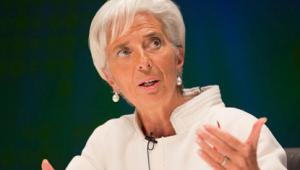Speaking In Dubai, she also said the region should drop energy subsidies, which transferred resources to rich people and sustained environmentally damaging practices, when the sums involved could be freed for more useful purposes.
Lagarde said: “I appreciate that government jobs can serve as a significant social ‘safety valve’. Yet when the public sector supports every fifth job, this comes with tremendous costs for fiscal sustainability, for the development of a dynamic private sector, and for governance.
“Ultimately, the common good is ill-served by a system of patronage that hurts productivity and heralds privilege, by the corruption that comes from putting cronyism ahead of capability. “
Patronage reduced incentives to invest in skills and knowledge the drivers of long-term growth, she said and could “magnify the sense of dissatisfaction, distrust, and resentment and it is ultimately self-defeating”.
She said public wage bills should be aligned with those prevailing in the private sector, “if done right – and with the right social protections – this could help unleash greater innovation and ingenuity in the private sector, tapping into the amazing potential of your young people”.
Turning to energy subsidies, both in oil exporting and importing states, Lagarde said: “There is really no excuse for the continued use of energy subsidies.”
These cost 4.5% of GDP among oil exporters and 3% among oil importers, despite lower oil prices and lacked transparency.
“They are vastly inequitable – favouring the wealthy who consume a lot of energy,“ Lagarde added: “Perhaps worst of all, they are subsidising environmental harm at a time when we need to go in the opposite direction to protect the planet and peoples’ lives, health, and futures.”
Lagarde also called for more efficient spending and public investment. She said: “In health, for example, worldwide spending inefficiencies subtract more than two years from healthy life expectancy – reducing them by 10% gets you the same benefit as boosting spending by 0.7% of GDP. In this region, there is a lot of scope for doing better in this area, especially in countries like Saudi Arabia and Egypt.”
The same applied to public investment, she said, with value lost due to inefficiencies in the investment process reaching fore than 20% in Jordan and Mauritius.
“We believe that strengthening public investment management practices could close up to two-thirds of the efficiency gap,” Lagarde said.
“Our analysis also suggests that reducing public investment inefficiencies in the [Gulf nations] to the levels of best performing countries could save over 2% of GDP each year.”






